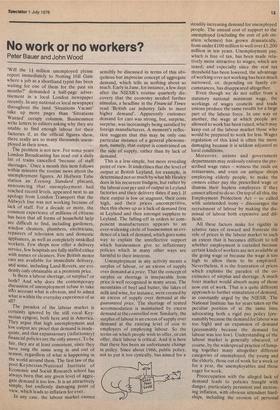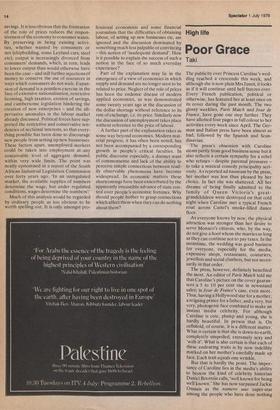No work or no workers?
Peter Bauer and John Wood
`Will the 1 million unemployed please report immediately to Notting Hill Gate where a job as a shorthand typist has been waiting for one of them for the past six months?' demanded a half-page advertisement in a local London newspaper recently. In any national or local newspaper throughout the land 'Situations Vacant' take up more pages than 'Situations Wanted' occupy columns. Businessmen write letters to editors asking why they are unable to find enough labour for their factories if, as the official figures show, there really are so many thousands unemployed in their town.
The problem is not new. For some years London Broadcasting has read out a daily list of trains cancelled 'because of staff shortages.' Once a month this item follows within minutes the routine news about the unemployment figures. At Holborn Tube station an Evening Standard placard, announcing that unemployment had reached record levels, appeared next to an apology from London Transport that the Aldwych line was not working because of lack of staff. For a decade or more, the common experience of millions of citizens has been that all forms of household help are difficult to find, including gardeners, window cleaners, plumbers, electricians, repairers of television sets and domestic appliances, as well as completely unskilled workers. Few shops now offer a delivery service, few hospitals are fully staffed either with nurses or cleaners. Few British motor cars are available for immediate delivery, and some, including Land-Rovers, are evidently only obtainable at a premium price.
Is there a labour shortage, or surplus? or both? And why does the contemporary discussion of unemployment refuse to take into account what is obvious, and to admit what is within the everyday experience of us all?
The paradox of the labour market is certainly ignored by the still vocal Keynesian epigoni, both here and in America. They argue that high unemployment and low output are proof that demand is inadequate, and that expansionary (inflationary) financial policies are the only answer. To be fair, they are at least consistent, since they have sung the same song in and out of season, regardless of what is happening in the world around them. The first law of the Post-Keynesian/National Institute of Economic and Social Research school has always been that any given level of aggregate demand is too low. It is an attractively simple, but endlessly damaging point of view, which leads to inflation for ever.
In any case, the labour market cannot
sensibly be discussed in terms of this ubiquitous but imprecise concept of aggregate demand, which tells us nothing about so much. Early in June, for instance, a few days after the NIESR's routine quarterly discovery that the economy needed further stimulus, a headline in the Financial Times read 'British car industry fails to meet higher demand'. Apparently customer demand for cars was strong, but, surprise, surprise, was increasingly being satisfied by foreign manufacturers. A moment's reflection suggests that this may be only one particular instance of a general phenomenon, namely, that output is constrained on the side of supply, rather than by lack of demand.
This is a less simple, but more revealing point of view. It underlines that the level of output at British Leyland, for example, is determined not so much by what Mr Healey does in his recurrent budgets, but rather by the labour cost per unit of output in Leyland factories and their delivery dates if any). If their output is low or stagnant, their costs high, and their prices uncompetitive, then this shows up as a lack of demand first at Leyland and then amongst suppliers to Leyland. The falling-off in orders to component manufacturers appears to an ever-widening circle of businessmen as evidence of a lack of demand, which goes some way to explain the unreflective support which businessmen give to inflationary policies which in many other ways are harmful to their interests.
Unemployment in any activity means a surplus of labour, or an excess of supply over demand at a price. That the concept of surplus or shortage is inseparable from price is well recognised in many areas. The mountains of beef and butter, the lakes of milk and wine, for instance, were created by an excess of supply over demand at the guaranteed price. The shortage of rented accommodation is maintained by excess demand at the controlled rent. Similarly, the surplus of labour is an excess of supply over demand at the existing level of cost to employers of employing labour. So the terms on which people wish to offer, or can offer, their labour is critical. And it is here that there has been an unfortunate change in policy. Since about 1966, public policy, not to put it too cynically, has aimed for a
steadily increasing demand for unemployed people. The annual cost of support to the unemployed (excluding the cost of job creation schemes) has grown dramatically, from under £100 million to well over 11,200 million in ten years. Unemployment pay, which is free of tax, has been made relatively more attractive to wages, which are taxed; and especially since the real tax threshold has been lowered, the advantage of working over not working has been much narrowed, or, depending on family circumstances, has disappeared altogether.
Even though we do not suffer from a statutory national minimum wage, the workings of wages councils and trade unions produce the same results for a large part of the labour force. In one way or another, the wage at which people are allowed to work has been raised, which may *keep out of the labour market those who would be prepared to work for less. Wages regulation of this kind is often the more damaging because it is seldom adjusted to local conditions.
Moreover, unions and government departments may zealously enforce the prescribed wage rates — witness the raids on restaurants, and even on antique shops employing elderly people, to make the owners either pay the prescribed wage or dismiss their hapless employees if they cannot afford to do so. On top of all this, the Employment Protection Act — so called with unintended irony — discourages the recruitment of labour by making the dismissal of labour both expensive and difficult.
All these factors make for rigidity in relative rates of reward and frustrate the role of prices in the labour market to such an extent that it becomes difficult to tell whether employment is curtailed because certain kinds of workers are not available at the going wage or because the wage is too high to allow them to be employed.
Nevertheless, it is the frustration of prices which explains the paradox of the co existence of surplus and shortage. A much freer market would absorb many of those now out of work. That is a quite different approach to further stimulation of demand, as constantly urged by the NIESR. The National Institute has for years taken up the peculiar position of at the same time advocating both a rigid pay policy (presumably because the demand for labour was too high) and an expansion of demand (presumably because the demand for labour was too low). Understanding of the labour market is generally obscured, of course, by the widespread practice of lumping together many altogether different categories of unemployed, the young and the elderly, those out of work for a week or for a year, the unemployables and those eager for work.
Preoccupation with the alleged lack of demand leads to policies fraught with danger, particularly persistent and increasing inflation, with obvious attendant hardships, including the erosion of personal savings. It is less obvious that the frustration of the role of prices reduces the responsiveness of the economy to consumer wants. By preserving in being existing activities, whether wanted by consumers or not (shipbuilding, some Leyland cars, steel etc), output is increasingly divorced from consumers' demands, which, in turn, leads to lower output than would otherwise have been the case — and still further injections of money to conserve the use of resources in ways which consumers do not wish. Expansion of demand is a pointless exercise in the face of extensive nationalisation, restrictive licensing, high taxation, erosion of savings, and cumbersome legislation hindering the creation of new enterprises — and the allpervasive anomalies in the labour market already discussed. Political forces have supported the restrictive and conservative tendencies of sectional interests, so that everything possible has been done to discourage new people from setting up new businesses. These factors apart, unemployed workers could be taken into employment at any conceivable level of aggregate demand, within very wide limits. The point was neatly epitomised in a report of the South African Industrial Legislation Commission over forty years ago. 'In an unregulated market, the available supplies of numbers determine the wage, but under regulated conditions, wages determine the numbers'.
Much of this analysis would be regarded by ordinary people as too obvious to be worth spelling out. It is only amongst pro
fessional economists and some financial journalists that the difficulties of obtaining labour, of setting up new businesses etc, are ignored and the discussion dominated by something much less palpable or convincing — this notion of 'inadequate demand'. How is it possible to explain the success of such a notion in the face of so much everyday experience?
Part of the explanation may lie in the emergence of a view of economics in which supply and demand are no longer seen to be related to price. Neglect of the role of prices has been the endemic disease of modern applied economics, as was demonstrated some twenty years ago in the discussion of the dollar shortage without reference to its rate of exchange, i.e. its price. Similarly now the discussion of unemployment takes place without reference to the price of labour.
A further part of the explanation takes us some way beyond economics. Modern material progress, it has often been noted, has not been accompanied by a corresponding growth in people's critical faculties. In public discourse especially, a distinct want of commonsense and lack of the ability to perceive simple connections between readily observable phenomena have become widespread. In economic matters these shortcomings have been exacerbated by the apparently irresistible advance of state control over people's economic fortunes. Why should people bother to grasp connections which affect them when they can do nothing about them?







































 Previous page
Previous page